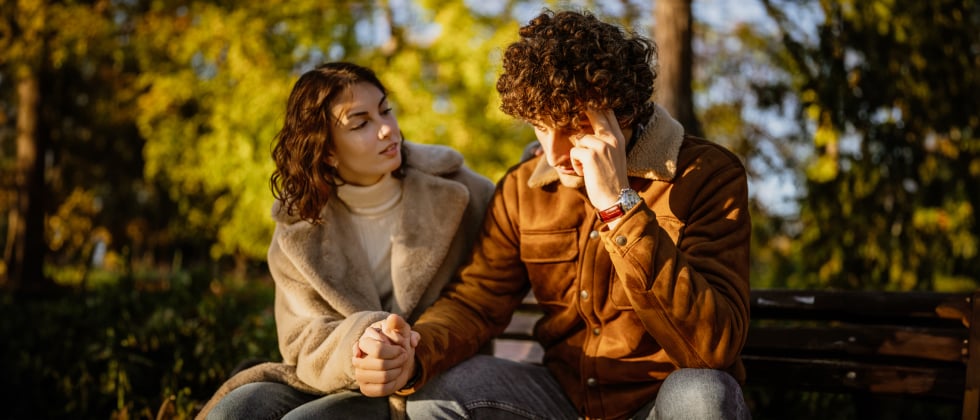
Unconditional Love and What It Means to Modern Relationships
You find it at the end of almost every romantic movie you’ve ever seen. The two characters overcome their differences and serendipitous misunderstandings and discover unconditional love. Fade to black and credits. We assume they live happily ever after.
But in the reality of this modern dating scene, a level-headed person may be wondering, is unconditional love real in a romantic relationship or just a sentimental fantasy we create? We explore its very real possibility, how you can spot its potential in a relationship and unpack the concept.
Table of Contents
What is unconditional love?
When we look at unconditional love and its meaning, it’s a timeless concept. It’s complete love. Love without ulterior motives or any expectations. Sounds pretty elusive, right? But let’s look at what is an example of unconditional love and the emotions behind it.
Expert behind this article
-

Dr Lalitaa Suglani, eharmony Relationship Expert, is an award-winning psychologist, and author specializing in practical advice on relationships, and attachment for singles and couples.
Unconditional love means there are no strings attached
This is the foundation of the concept. It doesn’t just incorporate the present them but also your prospective shared future. Things may feel perfect now but know that you’ll go through various phases in your relationship and that many of them will range from unpleasant to outright disastrous. Love being unconditional means not faltering during these times.
For example, they may start to develop consistent career issues, straining your financial positions or suffer an accident that permanently alters them and now they seem different from the person you fell in love with.
Complete acceptance
This means accepting the full you, acne and all. This level of intimacy is difficult to achieve because unconditional love means they’ve also stopped trying to change the negative traits you may have. They may still expect you and your relationship to grow but they’ve learned that the positive and negative are what make you.
For instance, you may be consistently daydreaming and perhaps miss important events, but they’ve also realized that this very trait is what also makes you spontaneous and romantic. You should be a source of pride and contentment with each other.
Forgiveness
Unconditional love doesn’t mean you’re not going to butt heads over issues now and then. Airing and working through problems and resentments building is vital to a healthy relationship or you risk bottling issues, increasing stress hormones1
But you need to express these feelings and also how to forgive and healthily move past them. This means trying to find a mutually respectful solution, that you both understand you’re vulnerable human beings who make mistakes and actively listen to each other.
Trust and security
What does it mean to love someone unconditionally and have it returned? At its core, it’s about feeling completely safe with that person. Safe to be yourself, safe about your vulnerabilities but, most of all, feeling safe that no matter what changes or how bad it gets, they’re there and they have you.
This is why many of us often associate unconditional love with familial love, particularly parents. Before finding unconditional romantic love, our parents are often the first people our instincts tell us to reach out to during bad times or when we just need unwavering support.
What does unconditional love mean to you?
What unconditional love definitely isn’t
It’s important to know that there’s a fine line between love that is unconditional and toxic love. This is because they can often share a concerning overlap in the relationship Venn diagram. So, you also need to ask yourself when it is beneficial and when it’s an actual threat to your well-being.
A license to do anything
Unconditional love is about a deep sense of trust. That emotion should stem from how they’ve behaved in the past and how they use your trust. Many people tend to get relationship fatigue, which can lead them to start abusing the freedoms you give each other.
They start to behave however they like and use your love and trust to serve their own purposes without thinking about how it’ll impact you. They may begin to become disrespectful of your time, skip important relationship hallmarks or even begin to behave unfaithfully.
When it’s only unconditional love right now
It seems petty to distinguish between true love and love which is unconditional but there is a difference. The latter is permanent, and it’s not based on a series of expectations you may have of each other or some current chemical connection that makes your love feel unshakeable.
The unconditional version comes into play when things inevitably fall apart. Entropy – the concept that all systems decline into disorder – is never more obvious than in romantic relationships. So it’s important to also watch your partner’s behavior when those bad days arrive.
A lack of respect for each other
You can’t hope to achieve a love that is truly unconditional without having a mutual and equitable notion of what it means to respect each other. You need to truly explore and resolve relationship issues when they come up, not expect your enduring love to be some infinitely expanding rug that conflict can be swept beneath.
The other person may push you into things they know to cross your boundaries, such as your sexual norms, or decide to make unilateral decisions without including you, like making a high-value purchase. This is a sign they’re abusing your love.
Neglecting yourself
When you’re looking at how to love unconditionally, it’s not about always putting yourself second, it’s about finding space in your life to put yourself both first. Yes, that’s going to involve quite a degree of sacrifice but that should be on both parts. You shouldn’t feel an overwhelming pressure to meet all of their needs but rather find novel ways to compromise so you both feel supported and content.
For instance, if they’re particularly outdoorsy and you’re not, you should find activities you can share and ones that are too out of your comfort zone but still fully support their participation.
5 Signs of unconditional love and how it should feel in the relationship
So we’ve looked at the ingredients of what makes up healthy and unhealthy altruistic love, let’s take a look specifically at the question, what does unconditional love feel like in a relationship and some signs to look out for.
u0022Signs of unconditional love include empathy, forgiveness and a commitment to work through challenges together while respecting each other’s individuality. It’s about loving wholeheartedly, but with wisdom and care.u0022
 Dr Lalitaa Suglanieharmony Relationship Expert
Dr Lalitaa Suglanieharmony Relationship Expert
Some other signs are:
You miss them when you’re not with them
There’s a natural honeymoon period in relationships when you just want to spend every second together. But there’s something to be said if this notion endures even as your relationship matures and develops into other stages.
This doesn’t mean you should literally strive to do this, just that you should always feel a bit incomplete without them. And it’s important to note that you should make sure the time you spend together is quality time because it’s obviously also still healthy to have me-time and time with other important people in your life.
You’re each other’s safe place
When the chips are down or something is going wrong in your partner’s life, you should be the first person they look to for support and comfort. And appropriately, you should be their rock. Someone who stays calm and positive when they’re falling apart so they have a steady emotional pillar to support their needs.
This means sometimes having to put up with their quirks when they get stressed and the irrationality that can sometimes follow. The point isn’t about fixing each other’s problems, it’s being a source of support and love while they adjust and address them.
Unconditional love is about knowing each other on a much deeper level
Remember, love that’s unconditional is something that’s built over time. It doesn’t just happen overnight. One of the reasons for this is how deeply and intimately you know your partner, which can take some time because you’re getting to know the entirety of a person.
This doesn’t just mean being vulnerable with each other and knowing your life stories – this will just happen naturally – but also the subconscious things they may not be aware of, like how they react to certain events and special ways to lift their mood.
They show you off whenever they can
You should be their pride and joy. They shouldn’t have to parade you around town on a float telling passersby of your greatness but rather take every opportunity to involve you in their social lives (to a healthy socially distant degree) and want to tell people in conversation just how special you are to them.
You should feel the same, unconditional love should prompt you to think and speak effusively when a topic related to them comes up. You should feel intense pride and love towards them and their life when the thought of them comes up.
When you don’t need to ask for their love or support
This speaks to knowing your partner well. They should be able to naturally intuit when you’re not being yourself and need support. Sometimes these should also be spontaneous, like writing them a little love note in a place you know they find it so they know you’re thinking of them or making them a special lunch to enjoy at work.
You should also look out for it in your partner and try to make them feel loved and seen in moments they didn’t even know they needed it.
Pros and cons of unconditional love
Unconditional love is often seen as the purest form of affection, but it comes with both rewards and challenges. As Dr Lalitaa Suglani explains, “Loving someone without exceptions or expectations can be one of the most profound and fulfilling forms of connection. But there are definitely pros and cons of unconditional love.
The benefits of unconditional love are rooted in its transformative power. It creates deep emotional security and trust, as the loved one feels accepted for who they truly are, flaws and all. This type of love can strengthen relationships, encourage personal growth and create a bond that transcends superficial disagreements. For example, a parent’s unconditional love for a child can provide a stable foundation for the child’s development. In romantic relationships, it allows for vulnerability and openness, creating emotional intimacy.
However, unconditional love also has its downsides, particularly when boundaries are not maintained. Loving someone without conditions doesn’t mean tolerating harmful behaviours. In unhealthy relationships, unconditional love can lead to enabling, self-sacrifice, or staying in toxic dynamics under the guise of “love.” It’s important to balance unconditional love with self-respect and clear boundaries.
Ultimately, the benefits of unconditional love come when it’s mutual and healthy.”
How to find unconditional love
Learning to love someone unconditionally takes a concerted effort from both parties. But there are ways you can cultivate it and look out for certain signs of that potential in a new connection if you’re asking yourself the question, ‘Can a person love someone unconditionally?’
Let’s look at some tips to build your relationship effectively to achieve that.
- No one can love you unconditionally until you love yourself. You’ll always have your guard up and won’t believe you deserve it, so your journey begins at self-love.
- Practice open communication with each other. This can be somewhat uncomfortable or confrontational at first but it will create free and clear communication models for your future.
- Learn healthy expressions of love. It can be easy to revert to more toxic modes like acting out to gain their attention or subtly trying to make them jealous but keep your expressions positive and it will naturally deepen your intimacy.
- Looking for a partner you share a degree of compatibility with also helps foster unconditional love as it sets the groundwork for your psychologies and behaviors naturally complementing each other in your relationship from the offset.
But every relationship is different so try to find your own paths too.
Unconditional love is to be treasured, not abused
Learning to love your partner unconditionally is something that’s learned. It isn’t sewn into the fabric of your connection from day one but rather is a product of a deeper compatibility that vines into so many aspects of your life. It takes time, patience, compromise and most crucially a love that not only deepens over time but becomes something much more profound, a life truly shared.
At eharmony, we like to give new love the best chance it can have to blossom into unconditional love by focusing on the science of compatibility in our matching, sharing a platform with members who take the process of finding that one-of-a-kind connection seriously. So stop delaying and find that connection today. Sign up for a free eharmony account.
Q&A – Expert backed answers to your questions
Do you have a burning question, personal story, or problem related to this topic? Send it in! The more details you share, the better we can understand your situation and offer meaningful guidance. Our relationship experts and editorial team may select it and respond with their advice. All submissions are anonymous. For product or account-related questions, please reach out to our Customer Care team via the Help pages.
The responses provided here are for informational and entertainment purposes only and do not constitute professional advice. Any advice shared is not a substitute for mental health services or counseling. We encourage you to contact a licensed therapist or support service for any urgent or sensitive issues you are experiencing. We do not provide real-time or personalized support, and we will only provide responses to submissions if we can offer valuable, helpful, and topical answers.
Thanks for sending in your question! Due to the volume of submissions, we’re unfortunately unable to reply to every single one. If your question gets answered, you’ll find it displayed below. — The eharmony team
How it works
Your search for a great relationship has never been easier with groundbreaking overhaul of the eharmony you know and trust.
We regularly review and update our articles to incorporate the latest research, expert insights, and study findings, ensuring you receive the most relevant information. Learn more about our editorial process.
- Current Version
-
-
Survey added by
eharmony Editorial Team
-
Survey added by
-
-
Expert advice added by
Dr Lalitaa Suglani -
Editorially reviewed by
Copy Editors -
Editorial quality review by
eharmony Editorial Team
-
Expert advice added by
-
-
Written by
eharmony Editorial Team -
Editorially reviewed by
Copy Editors -
Editorial quality review by
eharmony Editorial Team
-
Written by


















